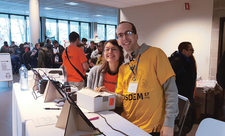FOSDEM 2017
Equilibrium

Long lines and interesting discussions awaited the visitor at this year's FOSDEM event in Brussels, Belgium.
Apparently, not even the FOSDEM team can guess which topics will attract a large audience and which will not, despite many years of experience. The result: Long lines formed before some rooms at FOSDEM'17, the largest European FOSS community event, which was held in early February 2017.
The fast campus LAN closed the breach for those waiting in line this time, however. The organizers broadcast live streams of presentations from all rooms by building their own content delivery network, proving that FOSDEM is in good shape in terms of hardware. Many of the videos are now online [1].
Buses and trains were running again, in contrast with the previous year, but visitors seem to like FOSDEM the way it is – including the beer event on the evening before the headliner. The organizers can only roughly estimate the number of visitors (about 8,000) because they do not sell tickets.
[...]
Buy this article as PDF
(incl. VAT)
Buy Linux Magazine
Subscribe to our Linux Newsletters
Find Linux and Open Source Jobs
Subscribe to our ADMIN Newsletters
Support Our Work
Linux Magazine content is made possible with support from readers like you. Please consider contributing when you’ve found an article to be beneficial.

News
-
Introducing matrixOS, an Immutable Gentoo-Based Linux Distro
It was only a matter of time before a developer decided one of the most challenging Linux distributions needed to be immutable.
-
Chaos Comes to KDE in KaOS
KaOS devs are making a major change to the distribution, and it all comes down to one system.
-
New Linux Botnet Discovered
The SSHStalker botnet uses IRC C2 to control systems via legacy Linux kernel exploits.
-
The Next Linux Kernel Turns 7.0
Linus Torvalds has announced that after Linux kernel 6.19, we'll finally reach the 7.0 iteration stage.
-
Linux From Scratch Drops SysVinit Support
LFS will no longer support SysVinit.
-
LibreOffice 26.2 Now Available
With new features, improvements, and bug fixes, LibreOffice 26.2 delivers a modern, polished office suite without compromise.
-
Linux Kernel Project Releases Project Continuity Document
What happens to Linux when there's no Linus? It's a question many of us have asked over the years, and it seems it's also on the minds of the Linux kernel project.
-
Mecha Systems Introduces Linux Handheld
Mecha Systems has revealed its Mecha Comet, a new handheld computer powered by – you guessed it – Linux.
-
MX Linux 25.1 Features Dual Init System ISO
The latest release of MX Linux caters to lovers of two different init systems and even offers instructions on how to transition.
-
Photoshop on Linux?
A developer has patched Wine so that it'll run specific versions of Photoshop that depend on Adobe Creative Cloud.
